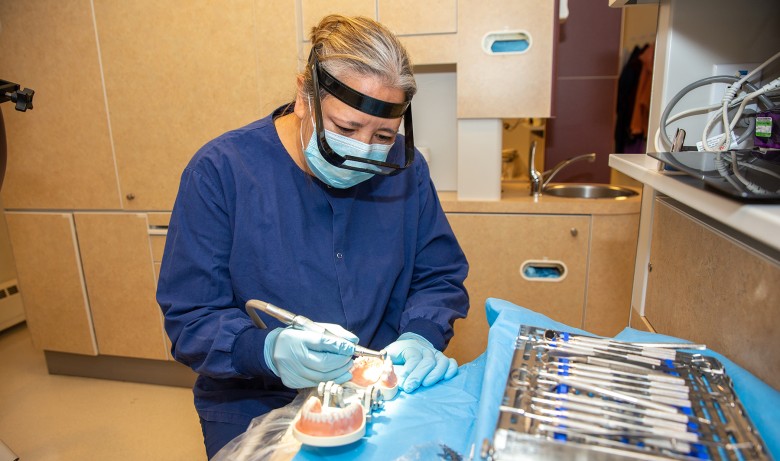Accreditation of Dental Therapy Program in Alaska; a Monumental Step Forward in Oral Health Equity
August 13, 2020
Today, the American Dental Association’s Commission on Dental Accreditation (CODA), which accredits all U.S. education programs for dentists and dental hygienists, granted accreditation to a dental therapy education program for the first time, acknowledging the successful program at Iḷisaġvik College in Utqiaġvik. This is a victory for community-driven and equity-focused health policy, which instead of imposing solutions on communities, lifts up the solutions communities devise for themselves.
Dental therapists are now working or authorized in at least some settings in 12 states and have expanded access to dental care for many Americans. In Alaska, dental therapists ensure that 40,000 people living in rural communities have regular access to dental care, often bringing care to people where they are, while simultaneously improving the health of their communities.
Dental therapy continues to receive bipartisan support, and is a proven means of cost-effectively expanding access to dental care while creating a more diverse dental workforce.
Below are statements from the chairs of the National Partnership for Dental Therapy (Community Catalyst, the National Indian Health Board and the National Coalition of Dentists for Health Equity), as well as the education program’s director, Dr. Sarah Shoffstall-Cone:
Statement of Sarah Shoffstall-Cone, DDS, MPH, director oral health promotion at the Alaska Native Tribal Health Consortium, commander, US Public Health Service:
“This is an exciting day for dental therapy, not only in Alaska, but across the country. This accreditation is an important stamp of approval for a provider that’s growing in prominence and that’s making a difference in the lives of so many people. We’re grateful to our many partners, funders, instructors, students and patients for making this day possible and we look forward to the meaningful work we’ll continue to do together going forward.”
Statement of Emily Stewart, executive director of Community Catalyst:
“This is a great victory for the countless advocates, educators and Tribal leaders who have fought for many years to bring high-quality, community-focused oral health care to those who are out of reach of the traditional oral health delivery system. The accreditation of the program at Iḷisaġvik College is a testament to the power communities have to design care that meets their needs and is a roadmap for the health system as a whole on how to provide equitable care.”
Statement of Lawrence Hill, DDS, MPH, chair of the National Coalition of Dentists for Health Equity (DHE):
“CODA’s accreditation of the dental therapy program at Iḷisaġvik College’s represents a watershed moment in our efforts to improve oral health equity in the U.S. CODA accreditation is an acknowledgement that Iḷisaġvik’s dental therapy program meets the highest educational standards. After all, CODA is the same body that accredits all other dental educational programs in the U.S. DHE hopes to see more dental therapy education programs receiving accreditation soon and more states embracing this evidence-based health policy.”
Statement of Stacy A. Bohlen, chief executive officer of the National Indian Health Board (NIHB):
“NIHB is pleased that the Alaska Dental Therapy Education Program has received accreditation from CODA. This program has for years educated Native oral health providers who are building paths to accessing oral health care and providing high quality care in their own Tribal communities. Accreditation validates the groundbreaking and life changing success this program continues to provide. Through NIHB’s Tribal Oral Health Initiative and the National Partnership for Dental Therapy, we will continue our work to support Tribes across the country that are bringing or want to bring dental therapy to their communities. NIHB sends our sincere congratulations to the faculty, staff and students whose work made today possible.”
To learn about ANTHC’s COVID-19 response, or the other programs and health services offered to our communities, please visit anthc.org
